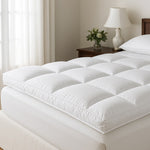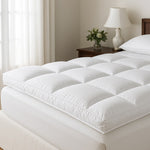You have no items in your shopping cart.
It varies, of course.
There's lifestyle factors, personal preferences, work or school hours, and so many other things that impact when to go to sleep. How long you sleep is more important.
Most adults need seven to nine hours of sleep per night for best health and functioning. It might be easiest to work backwards then - seven to nine hours - from your desired wake-up time to decide when it's best to go to sleep.
It's also important to consider your natural sleep-wake cycle, better known as your circadian rhythm. Most people have a natural dip in energy levels and sleepiness that occurs in the late evening, typically between 10 p.m. and 12 a.m. This period is often considered a good window for falling asleep.
Whenever you lay down on your Queen Anne pillow, consistency is key when it comes to sleep, so establishing a regular sleep schedule by going to bed and waking up at consistent times can help regulate your body's internal clock and improve sleep quality.
Additionally, it's important to create a relaxing bedtime routine, minimize exposure to bright lights (such as screens) before bed, and ensure your sleep environment is comfortable, cool, and quiet to promote better sleep.
Ultimately, finding the best time to go to sleep involves understanding your own sleep needs, experimenting with different bedtimes, and listening to your body's signals to determine what works best for you.
It varies, of course.
There's lifestyle factors, personal preferences, work or school hours, and so many other things that impact when to go to sleep. How long you sleep is more important.
Most adults need seven to nine hours of sleep per night for best health and functioning. It might be easiest to work backwards then - seven to nine hours - from your desired wake-up time to decide when it's best to go to sleep.
It's also important to consider your natural sleep-wake cycle, better known as your circadian rhythm. Most people have a natural dip in energy levels and sleepiness that occurs in the late evening, typically between 10 p.m. and 12 a.m. This period is often considered a good window for falling asleep.
Whenever you lay down on your Queen Anne pillow, consistency is key when it comes to sleep, so establishing a regular sleep schedule by going to bed and waking up at consistent times can help regulate your body's internal clock and improve sleep quality.
Additionally, it's important to create a relaxing bedtime routine, minimize exposure to bright lights (such as screens) before bed, and ensure your sleep environment is comfortable, cool, and quiet to promote better sleep.
Ultimately, finding the best time to go to sleep involves understanding your own sleep needs, experimenting with different bedtimes, and listening to your body's signals to determine what works best for you.








